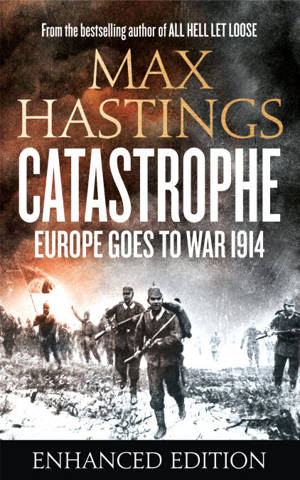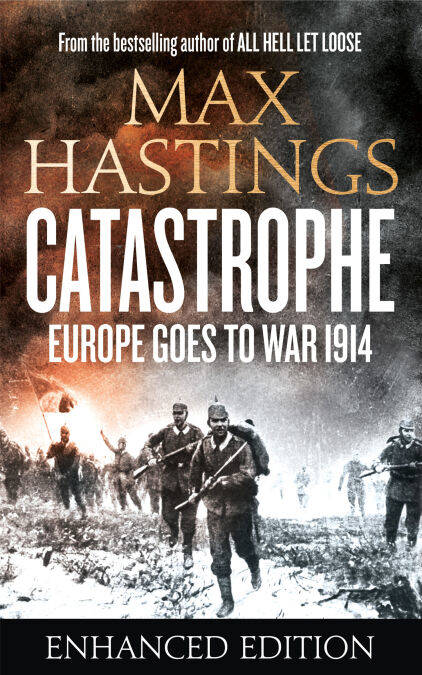
- Afhalen na 1 uur in een winkel met voorraad
- Gratis thuislevering in België vanaf € 30
- Ruim aanbod met 7 miljoen producten
- Afhalen na 1 uur in een winkel met voorraad
- Gratis thuislevering in België vanaf € 30
- Ruim aanbod met 7 miljoen producten
Zoeken
€ 6,99
+ 6 punten
Omschrijving
Best viewed on a tablet, includes exclusive audio and video.
The special edition of Max Hastings’ magisterial chronicle of Europe in 1914. Explore the position of armies in detail. Search the timeline for the ultimate overview. Watch footage of the protagonists, battlefields and wartime cities. Hear an exclusive author interview.
In 1914, Europe plunged into the 20th century’s first terrible act of self-immolation- what was then called The Great War. On the eve of its centenary, Max Hastings seeks to explain both how the conflict came about and what befell millions of men and women during the first months of strife.
He finds the evidence overwhelming, that Austria and Germany must accept principal blame for the outbreak. While what followed was a vast tragedy, he argues passionately against the ‘poets’ view’, that the war was not worth winning. It was vital to the freedom of Europe, he says, that the Kaiser’s Germany should be defeated.
His narrative of the early battles will astonish those whose images of the war are simply of mud, wire, trenches and steel helmets. Hastings describes how the French Army marched into action amid virgin rural landscapes, in uniforms of red and blue, led by mounted officers, with flags flying and bands playing. The bloodiest day of the entire Western war fell on 22 August 1914, when the French lost 27,000 dead. Four days later, at Le Cateau the British fought an extraordinary action against the oncoming Germans, one of the last of its kind in history. In October, at terrible cost they held the allied line against massive German assaults in the first battle of Ypres.
The author also describes the brutal struggles in Serbia, East Prussia and Galicia, where by Christmas the Germans, Austrians, Russians and Serbs had inflicted on each other three million casualties.
This book offers answers to the huge and fascinating question ‘what happened to Europe in 1914?’, through Max Hastings’s accustomed blend of top-down and bottom-up accounts from a multitude of statesmen and generals, peasants, housewives and private soldiers of seven nations. His narrative pricks myths and offers some striking and controversial judgements. For a host of readers gripped by the author’s last international best-seller All Hell Let Loose, this will seem a worthy successor.
The special edition of Max Hastings’ magisterial chronicle of Europe in 1914. Explore the position of armies in detail. Search the timeline for the ultimate overview. Watch footage of the protagonists, battlefields and wartime cities. Hear an exclusive author interview.
In 1914, Europe plunged into the 20th century’s first terrible act of self-immolation- what was then called The Great War. On the eve of its centenary, Max Hastings seeks to explain both how the conflict came about and what befell millions of men and women during the first months of strife.
He finds the evidence overwhelming, that Austria and Germany must accept principal blame for the outbreak. While what followed was a vast tragedy, he argues passionately against the ‘poets’ view’, that the war was not worth winning. It was vital to the freedom of Europe, he says, that the Kaiser’s Germany should be defeated.
His narrative of the early battles will astonish those whose images of the war are simply of mud, wire, trenches and steel helmets. Hastings describes how the French Army marched into action amid virgin rural landscapes, in uniforms of red and blue, led by mounted officers, with flags flying and bands playing. The bloodiest day of the entire Western war fell on 22 August 1914, when the French lost 27,000 dead. Four days later, at Le Cateau the British fought an extraordinary action against the oncoming Germans, one of the last of its kind in history. In October, at terrible cost they held the allied line against massive German assaults in the first battle of Ypres.
The author also describes the brutal struggles in Serbia, East Prussia and Galicia, where by Christmas the Germans, Austrians, Russians and Serbs had inflicted on each other three million casualties.
This book offers answers to the huge and fascinating question ‘what happened to Europe in 1914?’, through Max Hastings’s accustomed blend of top-down and bottom-up accounts from a multitude of statesmen and generals, peasants, housewives and private soldiers of seven nations. His narrative pricks myths and offers some striking and controversial judgements. For a host of readers gripped by the author’s last international best-seller All Hell Let Loose, this will seem a worthy successor.
Specificaties
Betrokkenen
- Auteur(s):
- Uitgeverij:
Inhoud
- Aantal bladzijden:
- 672
- Taal:
- Engels
Eigenschappen
- Productcode (EAN):
- 9780007546312
- Verschijningsdatum:
- 11/09/2013
- Uitvoering:
- E-book
- Beveiligd met:
- Adobe DRM
- Formaat:
- ePub

Alleen bij Standaard Boekhandel
+ 6 punten op je klantenkaart van Standaard Boekhandel
Beoordelingen
We publiceren alleen reviews die voldoen aan de voorwaarden voor reviews. Bekijk onze voorwaarden voor reviews.











